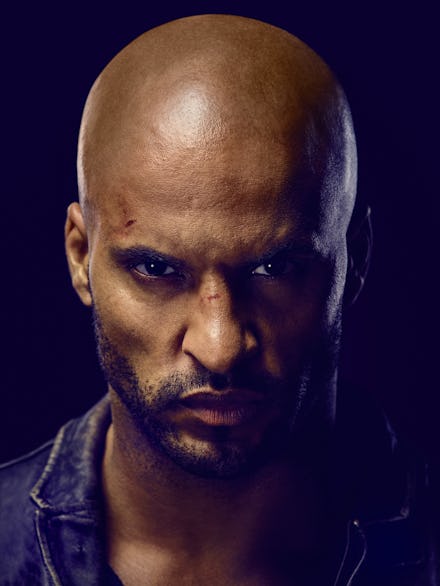'American Gods' reinvents itself through its black protagonist

Shadow Moon is a racial enigma in American Gods, the fantasy novel by Neil Gaiman. The author describes his protagonist in ethnically-vague terms: Shadow has "light gray eyes," "dark hair" and "cream-and-coffee skin," Gaiman writes.
Shadow is asked, at different points in the book, whether he has "Indian blood" or "nigger blood." Readers eventually learn that Shadow's father is white, but his mother's race remains conspicuously unsaid.
"What are you?" a prison guard asks in an early passage. "A spic? A gypsy?"
Ricky Whittle is less ambiguous. The British actor — who plays Shadow in the TV adaptation of Gaiman's novel, which premiered Sunday on Starz — is multiracial, like his character. But his blackness is clear, both visually and narratively. At one point in an early episode, a white character named Czernobog asks Shadow if he is "black" outright.
"Is that a problem?" Shadow replies coldly.
The decision by showrunners to cast a visibly black actor as their lead bucks a long-standing trend in Hollywood. It marks the rare occasion where a piece of American screencraft embraces a character's non-whiteness rather than erasing it. And the show is richer for it.
But the decision also alters the story's symbolism. Race is a central theme in American Gods. Its premise — that immigrants, slaves and explorers from around the world brought their gods with them, then abandoned them, when they came to the United States — is largely predicated on racial difference.
In the book, Shadow seems intended to subvert these differences. He is a race-less everyman, wandering America's cultural crossroads with an almost fatalistic disregard for where he fits in.
"[What] is important to us about Shadow is that he is a mix of races," Gaiman said at a New York City press event in April. "[We] probably saw auditions from 400 potential Shadows, and there were some actors who were fantastic and who were absolutely, unquestionably black. And Starz, bless them, were the ones going, 'Well, says in the book that he's mixed race. And we want to keep him mixed race.'"
It's apparent, from this statement, that Starz wanted to preserve Shadow's racial ambiguity for the screen. Like in the book, this vagueness would have made the character something of a cultural blank slate, onto which viewers could project whatever racial ideals they saw fit.
But that's not what happened. Shadow got blacker. And rather than become more malleable, his backstory was infused with one of the more starkly politicized identities in American culture. References to Shadow's mother — who Mr. Wednesday, Shadow's employer, describes as having a "big Afro" — become subtle nods to the Black Power era. An early scene where Shadow is hanged from a tree evokes the legacy of lynchings in the Jim Crow South.
Shadow's symbolic resonance shifts in kind. The Shadow of Gaiman's novel reflects a melting pot vision of America, where cultures bleed into each other to make freer, untethered new identities. The Shadow of the TV series tells a different story. His blackness forces a less flattering reckoning with American culture, one rooted in racial violence and exploitation.
It's a more honest vision, too. And its bluntest articulation comes in the opening scene of the second episode — a scene that's not in the book — when Anansi, the African spider-deity, appears to a ship's hold of captured Africans. Anansi launches into a tirade about the centuries of horror they will face in the U.S. He proceeds to unlock the captives' chains, and urges them to slit their white captors' throats and set fire to the ship.
"But the ship will burn," one of the Africans says. "All of us will die."
Anansi chuckles. "You already dead."
Moments later, the Africans rush the deck, and the ship erupts in flames. And Anansi rides the floating wreckage all the way to America's shores.